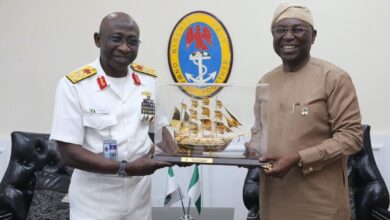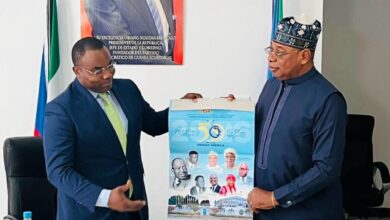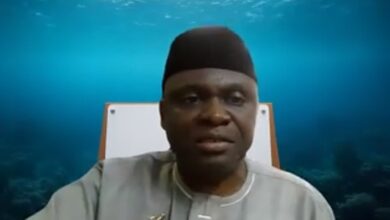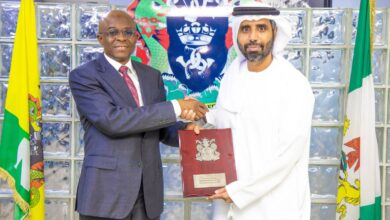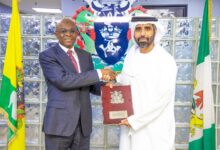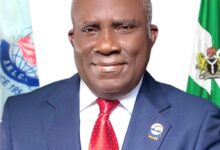Seafarers Lifeblood of Maritime Industry ,Says Oyetola as Mobereola Promises Better Collaboration
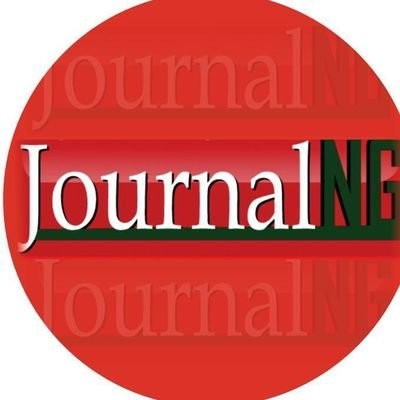
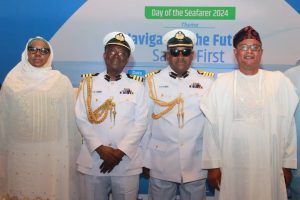
Minister of Marine and Blue Economy, Adegboyega Oyetola, has stated that Seafarers are the lifeblood of the maritime industry, which is essential to the success of the Blue Economy. This comes as the Director General of the Nigerian Maritime Administration and Safety Agency (NIMASA), Dr. Dayo Mobereola, stated that Nigeria has the potential to be a maritime powerhouse, with the right policies in place.
This was contained in a press release issued by Edward Osagie, NIMASA’s Head of Public Relations
According to Osagie, the Minister, who stated this in Lagos during the commemoration of the 2024 Day of the Seafarer, assured in his keynote address that the Federal Government is committed to the development of the Nigerian maritime sector.
He stated that the theme for this year’s celebration; “Navigating the Future, Safety First,” aligns with the vision of the Ministry of the Marine and Blue Economy.
“Seafarers are the lifeblood of the maritime industry. They endure the isolation of the open sea, the unpredictability of weather, and the myriads of challenges that come with navigating some of the world’s busiest and most perilous waters. Their resilience, dedication, and unwavering commitment ensure that goods and resources reach every corner of our planet, supporting livelihoods and promoting international trade”, he said.
The Minister who was represented by the Director, Maritime Safety and Security in the Ministry of Marine and Blue Economy, Mr. Babatunde Bombata, gave the assurance that the Federal Government remains committed to collaborating with industry stakeholders and steadfast in advocating for the rights and welfare of Nigerian seafarers. “We are committed to providing comprehensive training programmes, enforcing stringent safety regulations, and offering continuous support to ensure our seafarers are among the best trained and most resilient in the world. We are dedicated to building on this foundation, ensuring that Nigerian seafarers are equipped to meet the challenges and opportunities of the modern maritime landscape”, he said.
Furthermore, he pledged the Ministry’s resolve to prioritize the growth and development of the Marine and Blue Economy Sector, noting that it’s development of the sector will greatly benefit all Nigerians and future generations. “We are working closely with stakeholders in the private sector, international organizations, and other government agencies to create an enabling environment for the growth of the Maritime and Blue Economy”, he stated.
He also used the opportunity to call for stakeholders’ support in the development of the sector, noting that the Ministry cannot undertake the task alone. “This celebration of World Seafarers Day presents a unique opportunity to explore emerging issues and propose innovative solutions to the challenges facing the sector. We must remain resolute and deliberate in promoting the growth and development of the Marine and Blue Economy Sector, as the Ministry cannot achieve this alone”. On their part, the Chairman of the Senate Committee on Maritime Safety, Education and Administration, along with his counterpart in the House of Representatives, applauded the seafarers for their resilience and assured them of the Government’s continuous support to guarantee their well-being.
They assured of the readiness of the National Assembly to work with NIMASA and other stakeholders to support any legislation aimed at advancing the rights and safety of all seafarers. “Together, let us continue to strive for a maritime world that is equitable and inclusive for all,” Senator Wasiu Eshinlokun stated.
On his part, the Director General of the Nigerian Maritime Administration and Safety Agency (NIMASA), Dr. Dayo Mobereola, acknowledged the uniqueness of the profession and the challenges faced. He noted that the theme for this year’s celebration, “Navigating the Future: Safety First,” is a call to address the challenging conditions seafarers face while navigating the sea. He emphasized the need for greater focus on their well-being and safety at sea.
“We recognize the humongous challenges Seafarers face while sailing; ranging from piracy, kidnapping, encounter at war zones exposure to health risks and unfair treatment. Notwithstanding all these, Nigeria has recorded zero piracy incidents in the last two years; we will not rest on our oars as the life of every seafarer matters”, Mobereola stated.
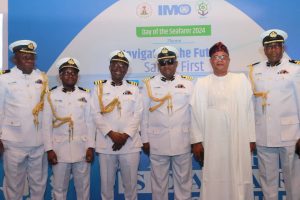
He assured that the Agency will continue to collaborate with both local and international organizations to address global issues affecting seafarers and ensure their safety while navigating the future.
“Nigeria has the young population to compete with other countries whose seafarers contribute immensely to their Gross Domestic Product (GDGDP. Hence, the Agency will continue to invest in training and capacity-building programs to enhance seafarers’ skills, welfare and employment opportunities”.
Dr. Mobereola used the opportunity to inform stakeholders that the Agency is working tirelessly to strengthen its legal frameworks by domesticating all Maritime Labour related ILO Conventions ratified by Nigeria. “These conventions include the Maritime Labour Convention (MLC) 2006 as amended, the Seafarers Identity Document (SID) Convention as amended, and the Dock Work Convention”, he said.
“We will continue to focus on implementing programs and projects to improve seafarers welfare, including mental health support, safety training, and emergency assistance. Also we will continue to eliminate substandard vessels from our waters and ensure wrecks are removed to aid navigation and safety for our seafarers”, he assured.
He also mentioned that many beneficiaries of our Nigerian Seafarers Development Programme (NSDP) are currently undergoing mandatory sea-time training aboard ocean-going vessels. The Agency is collaborating with key stakeholders like the NLNG Shipping and Marine Services Limited, the Nigerian Content Development and Monitoring Board (NCDMB), Indigenous Shipping Companies and the Nigeria Immigration Service (NIS), all geared towards boosting the capacity of the seafarers.
Katie Higginbottom from the International Transport Federation (ITF), who joined virtually, emphasized that seafarers are a critical part of the maritime sector. She also commended NIMASA’s renewed collaboration with the ITF to ensure seafarers receive the necessary attention from their respective governments.
Professor Max Mejia, President of the World Maritime University, who also joined virtually, expressed gratitude to the seafarers and described them as the modern day heroes who deserve celebration.
In their goodwill messages, stakeholders took turns to praise the invaluable contributions of seafarers to the global economy, urging governments to continue supporting them through favorable policies that will enhance their wellbeing in line with the Maritime Labour Convention (MLC) 2006.
They include President General of the Maritime Workers Union of Nigeria, Comrade Adewale Adeyanju; President of the Shipowners Association of Nigeria; Flag Officer Commanding Western Naval Command, Rear Admiral Hassan; among others.”
The International Day of the Seafarer is celebrated annually on June 25 to recognize the contributions of seafarers to international seaborne trade and the world economy as a whole. The day is organized by the International Maritime Organization and recognized by the United Nations as an observance day.






